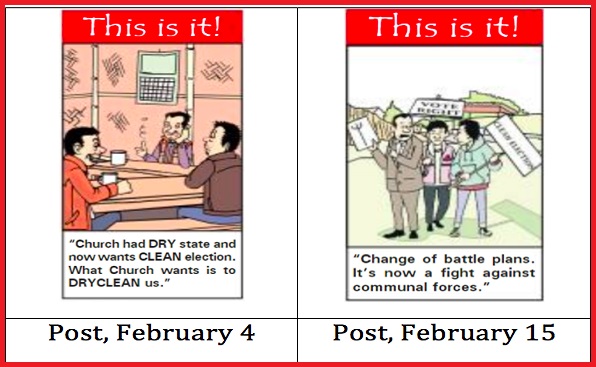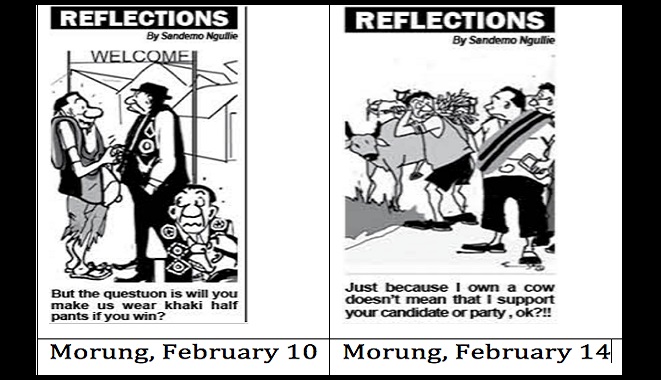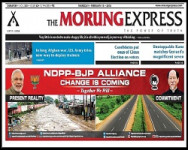Waging identity wars in the Nagaland press
The shrill exchange between the Church and the BJP on the role of religion in public life in Nagaland was among the highlights of the 2018 Assembly election. The general secretary of the Nagaland Baptist Church Council (NBCC), the apex body of Baptist churches of Nagaland, and several other church leaders warned Christian Nagaland to guard against Hindutva. The BJP’s rivals, the ruling Naga Peoples Front (NPF) and the Congress, tried to benefit from the NBCC’s call.
The NPF manifesto highlighted the threat to Naga identity, but framed identity in terms of cultural values, social practices, and customary law (Feb 7). The Congress manifesto too did not refer to religious identity even as it promised subsidies for pilgrimage to Jerusalem (Feb 9). Both were released before the NBCC General Secretary addressed a letter to party presidents (Feb 10). The letter noted that the BJP was trying to infiltrate “Nagaland, the frontline of the Christian majority state in the country.” It catalogued the growing attacks on minorities across the country and asked, “Is your political party willing to sell Jesus for the sake of development? Do you remember what they tried to do with our Christmas and Good Friday?” It warned politicians, “Do not surrender your Christian Principles and above all your faith for the sake of money and development into the hands of those who seek to pierce the heart of Jesus Christ to bleed and allow God to weep.” As the Congress pointed out, “this was for the first time in the history of Nagaland that Nagaland Baptist Church Council (NBCC) had come out openly” (Feb 13).
After the NBCC addressed party presidents, the Congress called for a “secular front against divisive agenda” (Feb 11) and promised a “god-fearing and secular-minded” government (Feb 24). The NPF warned that “unless we stand firm” a day may come “when the unique identity of the Nagas and their faith could be destroyed by forces alien to the Naga people” (Feb 22).
The BJP’s lamented that its candidates were “being targeted as anti-Christians” even though they belonged to “one church or the other.” It pledged to protect minorities (Feb 17), promised subsidies for pilgrimage to Jerusalem (Feb 22), promised that faith can never be compromised under the entirely Christian leadership of the Nagaland BJP (Feb 14, Feb 22), and praised the early missionaries for spreading education (Feb 18). The party also exhorted other parties to remain secular (Feb 11, Feb 22). It asked them “to maintain healthy decorum” because “whichever party comes to power in the state will have to work with the BJP party in the Centre” (Feb 22). Interestingly, the BJP went a step ahead and publicly questioned the Church. It said the while it was not blaming the NBCC, “there are some few leaders at its helm who are trying to confuse the Nagas” (Feb 13). The offensive forced the Church to clarify that it was not opposed to any party (Feb 22, Feb 24). The clarifications notwithstanding, a district unit of the BJP openly blamed the Church for the defeat of its candidate (Mar 8).
(The Nationalist Democratic Progressive Party (NDPP) which is now part of the ruling alliance chose to mostly stay mum on identity and kept repeating the development mantra.)
These unprecedented developments triggered a debate in Nagaland on the role of religion in the public sphere. Newspapers served as an important site for this debate. We will refer to the Morung Express (henceforth, Morung) and Nagaland Post (henceforth, Post) to understand the role of the media in such debates.
Readers’ polls and cartoons
Post conducted several polls that asked questions related to politics and religion, while Morung skipped the issue. Interestingly, Post conducted the first poll on this issue before the NBCC’s formal statement. That poll suggested that 62% people opposed the Church’s involvement in politics (Jan 29). A poll conducted afterwards revealed that 50% respondents thought that the Church was "indulging in politics" (Feb 19). A few days later, 59% respondents reported that they believed that "the warning of the church" is not going to be heeded (Feb 24). The lack of success of the Clean Election Campaign seems to have influenced public perception of the Church. According to polls, about 82% respondents thought that clean election had become an empty slogan (Feb 9) and 80% thought that the campaign had no impact on ground (Feb 12).
While we do not know how many people voted in these polls, the fact that these questions were asked in a leading daily of Nagaland is in itself a significant fact. However, since the reach of newspapers is mostly restricted to urban areas in a largely rural state, the polls at best reflect the urban mood. It is noteworthy that the polls also show that 63% people believed that Hindutva was a threat to Nagas (Feb 23) and 71% believed that hypernationalism was a threat to peace and unity of the country (Jan 30). Also, there is broad agreement between Morung and Post on the outcome of polls on related questions, which points to their reliability. More importantly, the nuanced response to questions on religion is not an exception. For instance, 76% respondents thought that the government was not serious about solving the political problem (Feb 1) and yet 70% opposed linking solution to elections as unrealistic (Feb 4).
Cartoons in both Morung (Jan 28, Feb 18) and Post (Feb 4) mocked the involvement of the Church in politics, even as they made fun of the BJPs clumsy attempts to strike roots in the state – Morung (Feb 10, Feb 14) and Post (Jan 25, Jan 28, Feb 23). A Post cartoon also ridiculed those who suddenly found themselves in the secular camp (Feb 15).
The polls reveal that people refuse to embrace binaries and are in the process questioning established authority. The cartoons endorsed the popular sentiment.
Church under spotlight
Post’s editorial (“Socio-spiritual concern,” Feb 11) endorsed the NBCC’s call, but added that the Church should also “focus on reformation and bring qualitative spiritual changes especially against corruption and the easy money syndrome. On this, the BJP is the least of the problems if people learn to say ‘No’ to allurements.” In an earlier editorial (Peril of phrases, Jan 21), Post deplored the particularistic politics of political parties and questioned “the overuse of ‘communalism’ as a card by a beleaguered Congress.” Yet another editorial in Post (Unending debate, Feb 14) pointed out that minorities have seen persecution under the Congress as well and that the communalism debate was loudest during elections. It added that the opportunistic defence of secularism will not work as the BJP has successfully recast the debate in terms of nationalism vs terrorism binary. While Morung avoided religion in its editorials, like Post it carried several op-eds on the matter.
Op-ed contributors turned the spotlight on the Church and raised four issues. First, they wondered if the Church enjoyed too much temporal power reminiscent of its medieval counterparts (Not only Politicians and Bureaucrats are Impostors! Morung, January 29).
Second, they asked the Church to focus on corruption within: “Almost all potential and suspected corrupt officials and leaders are members of her congregation. Instead of reigning in and checking on these suspicious people, the church bows before them and gives them the highest honour... the church today has become guilty of being “fed fat” and “obese” by the inflow of corrupted money from a number of means and channels” (“Clean Church treasury before Clean Election,” Morung, Feb 12). Others pointed out that "our Churches have enough money, and that money belonged to the poor, in the first place" (“The dilemma facing the Naga voter,” Post, Feb 9; Morung, Feb 11). Still others suggested that the Church is misusing money, even as the mission was underfunded that "portrays Christianity as an inferior religion for the reason that each poorly paid missionary represents Christianity in general" (“Wealthy churches but poor for mission,” Feb 14).
A veteran church leader, who otherwise thought it important to warn against the BJP’s infiltration, lamented the corruption within the Church: “We compete only in who can build the largest church building (mostly with money stolen by corrupt politicians and bureaucrats who then donate it to the church)… The Church sins when morally corrupt politicians and government officials are permitted to occupy the pulpit. The Church sins when corrupt money and corrupt people help build worship centers and gospel ministries and missions” (“The ultimate concern,” Post and Morung, Feb 20).
Third, contributors wondered why the Church did not raise “voice when the NPF Government manned by a so called Christian leader has been entertaining the BJP Government by bringing Hindu institutes into the land? Is this some kind of partiality being shown to some parties? Is this really `clean’?” ("An open letter to ABAM and ABPF," Morung, Feb 11, also “What did you expect?” Post, Feb 13). The Church was asked to “steer clear from political discussions and teach their members to live a righteous life which will be more effective” (The Daily dose of depression, Morung, Feb 22). A few asked people to “render to Caesar the things that are Caesar’s” (“In matter of election or solution,” Morung and Post, Jan 30). The BJP also invoked this Biblical phrase to exhort “those leaders going on overdrive to mix politics and religion to… Trust the electorate to decide what is best for them: corruption or corruption-free governance, public development or personal development, progress or stagnancy” (The blind leading the blind, Feb 22).

Fourth, an editorial of Post (Test of self-trust, Feb 24) suggested that the Church is getting distracted by interfering in things beyond its control. The clean election campaign “got derailed when the church was made to change tracks by acting as the catalyst of NGOs for ‘Solution Before Election’.” The Nagaland Joint Christian Forum (NJCF) though denied endorsing ‘Solution Before Election’ (“Wisdom and Maturity Must Prevail in Any Critical Situation,” Post, Jan 30).
Yet another criticism focused on how the Church’s clean election campaign “strengthen[ed] India’s democratic institution” and suggested that independent Nagaland was the only alternative to India’s defective majoritarian electoral system (Nagaland state election and defective election system, Post, January 24).
Finally, there were those who wanted people to focus on everyday problems and fight corruption that has corroded the foundations of the society rather than wait for “the Delhi and Jerusalem wallahs” who promise heaven (“With or without election or solution; the fight against corruption must go on,” Post, Jan 27; Morung, Jan 28).
In defence of faith
In the face of growing dissent, the Bible (Hebrews 13:17) was referred to exhort people to “Obey your leaders” (“A Pastor, Somewhere in Nagaland,” Post, Feb 5). It was suggested that candidates should sign a “bond agreement… in the name of our Lord Jesus Christ” ("Identical ailment of two brothers," Jan 28). Alternatively, Christian majority states “should field the candidates who are okayed by the Church” (“Are we going back to Old Testament time allowing only a profession to serve the Lord?” Jan 25). The end product would hopefully be a spiritual leadership like Donald Trump who “conducts weekly Bible studies” and the Zambian President who “prays and cries, preaches.”
Contributors resorted to Biblical imagery and terminology to shore up support in favour of faith. Following 2 Corinthians 6:14, people were exhorted to “depart from the BJP and join in any regional or national party where there’s no caste system” ("Open letter to all Readers and beloved people," Post, Feb 2). The Nagaland BJP was told that “You have joined a party that believes in a 'truth' that is not the TRUTH… judgement will come to you when you have to face the Lord" (“An Open Letter to Our Naga BJP Politicians,” Post, Feb 8). The NJCF went a step further and equated the outsider with non-Christian: “In a Christian majority state like Nagaland, it pains us to see that we have come to a stage where outsiders seem to play a major role in deciding our fate. We choose to embrace political ideologies of others rather than keep our faith intact” (“Nagaland Joint Christian Forum Appeals,” Post, Feb 19).
A veteran church leader equated the RSS-BJP as satan in the guise of serpent and warned that “For the first time, the RSS with their Hindutva ideology has decided to challenge the Church of Jesus Christ in Nagaland, in Meghalaya, and surely in Mizoram in the near future. Victory for the RSS-controlled BJP in the Nagaland State election and the two other Christian-dominated North-Eastern states means enslavement of the North-Easterners and persecution of the Church” (The ultimate concern, Post and Morung, Feb 20). He added that there was “only one regional party totally committed to regional development.” This party came to power due to the Vajpayee government’s blatantly partisan role in the 2003 election and it remained an ally of the BJP for a decade and a half.
Another veteran church leader warned people against forgetting that “the precious blood of Jesus Christ… has purchased Naga people” (“Vote to save Nagaland,” Morung and Post, Feb 25). A lay reader presented his case in equally dramatic manner and claimed that the election “will decide between the “Trishul” and the Cross of Christ” and warned, “Be not Esau, be not the enemy of God and enemy of our land which is known… as “land of Christ” by our Hindu Rashtra neighbour. Beware of the curses given to Esau in Gen 27:38 & 40” (“Be not Esau & Be not a Cursed Community,” Post, Feb 26).
Defence of rights in general was rare. A Reverend, for instance, reminded readers that “The Christian Community does not need protection in Nagaland” particularly from a party whose fringe has wreaked havoc across the country (“Give to Caesar what belongs to Caesar,” Feb 25). He added that the community demands “its rights as human beings and citizens in the whole country.” Likewise a veteran church leader traced the effects of intertwining of religion and politics across the world and pleaded that, "Our love of identity and independence is no crime...I am Christian and hence, I make no apologies about Christ as my personal Savior. Christ is for all; none are excluded. However, I cannot force my belief on others. I can only live, act, and speak for Christ and for this, I must not be castigated, and neither must my fellow Christian sisters and brothers in the largest democratic country in the world" (Big and Small: A Paradigm of Co-existence in an Age of Globalization," Morung, Feb 22).
Exclusive morality
We have so far seen that the public debate is heavily loaded with religious imagery and terminology. This has fostered an exclusive morality. Most contributors appealed to people that "As a Christian we should not sell our vote…" (“Unethical election process brings corruption in political system,” Post, Feb 13) because “While no religion has a monopoly on good behavior, Christians are generally expected to live exemplary lives for the sole reason that we are set apart as followers of Christ” (“Deja vu!” Post, Feb 26).
Since the expectation of good behavior is conditional upon faith it is not surprising that non-Christians are stereotyped and not expected to be moral agents. An op-ed contributor, for instance, wrote “For non-Christian voters and who do not fear God let them have their own decisions” (“Until true Christians are voters and candidates are true Christians," Post, Feb 13). Another claimed that “Many committed Christians refuse to take money from the candidates and party workers... God must be very pleased with them. But those who are not born again Christians are demanding more money” (“Is bribery a sin?” Post, Feb 23). Yet another felt that it was wrong to blame the Church because “aren’t we all members of a church?? (I’m keeping aside the IBI [Illegal Bangladeshi Immigrant] voters in Dimapur)” ("‘CLEAN ELECTION’ can be a reality," Feb 25). In fact, one did not have to be an outsider or a member of a communal party to be othered. A secretary of the Pradesh Congress Committee who posted Shivaratri greetings in the social media was trolled. The incumbent chief minister, a Christian, was described as “a person who has leanings towards Hinduism and Animism” ("An open letter to ABAM and ABPF," Feb 11)
In lieu of a conclusion
The clean election campaign of the Church and its exhortation to protect Christianity were the subject of more than half of the op-eds written during the election campaign. Pastors and reverends contributed about 15 per cent op-eds. On the other hand, there was only a passing interest in the everyday problems of the people. Concrete proposals to deal with everyday problems were rarely put forward, let alone debated.
The Church has made enormous contribution to the development of Nagaland in a variety of fields including primary education, tourism, and indigenous apples cultivation. The nationalist sentiment, like the Church, has helped bring diverse Naga tribes together and instilled a sense of pride among them as a people. So, it is not surprising that Christianity and Naga nationalism figure prominently in public debates. However, an all-pervasive presence of religion in public sphere and the resort to nationalist slogans at the drop of hat restrict public debate.
As soon as any debate starts the holy and Naga flags are raised followed by endless Christian and Naga self-flagellation. An example is in order. Writing soon after the declaration of elections, an op-ed contributor concluded that “We have not only let the Church down, we have shamed the Lord with our misdeeds. We are not fit to be Christians” (Nagaland for Christ & clean elections, Morung and Post, January 21). Several op-ed writers felt ashamed by the fact that corruption thrived in overwhelmingly Christian Nagaland and that this sullied the image of Christianity among the unbelievers and of the Nagas among the non-Nagas. A simplistic understanding of religion and its relationship with individual and public morality pervades debates in Nagaland.
In any case, since moral conduct is dependent upon faith, much of the debate throughout the campaign was about how to protect the faith and how to identify the faithful. Politicians conveniently affirmed faith in Christ and Naga nationalism (i.e., Nagaland for Christ). Since Nagaland for Christ is the solution to all problems, there was not much room for policy alternatives.
Non-Naga Christians, non-Christian minorities, non-Naga tribal minorities, atheists, and women rarely participated in public debates during elections as the debates were exclusively cast in terms of Christianity and Naga nationalism. In fact, unlike the Baptist churches, even the Catholic Church stays in the background. The only non-Naga contributor belonged to a reputed Christian College in the state.
In light of the above, we can ask questions for which there are no clear answers: Can newspapers restrict the space available for religious discourse so that there is more room for everyday issues? Can newspapers focus on everyday issues when readers seem to be interested in issues of identity? Can newspapers improve the representation of minorities in debates? It needs to be noted that Naga newspapers are largely op-ed submission driven. (Morung is trying to build in-house analytical and investigative capacities though.) Even if the newspapers leave space for secular debate there is no guarantee that they will get submissions to fill in that space, let alone submissions that discuss concrete issues rather than talk in highly abstract terms.
[There is another way of looking at the predominance of identity in the opinion space during elections. This predominance is perhaps inevitable in absence of a resolution of the longstanding Naga political problem. Further, it can be argued that newspapers reinforce the centrality of, say, religion in the public sphere by giving so much space to identity related questions. However, this makes the dominance visible and evokes challenge as happened during this election.
So, even as the faithful rallied behind identity with their blood-soaked slogans, the challengers focused on mundane issues such as corruption in the Church and also reminded the Church of the gospel (“Render unto Ceasar”). Similarly, Polls showed that lay readers refused to embrace binaries imposed by the establishment. It is also noteworthy that the criticism of the Church came from both within and without and that even partisans of independence had their own reasons to be critical of the Church. Finally, while the Church triggered the debate it did not have control over it and had to often douse fires lit by overenthusiastic followers. A Reverend claimed that just as the “RSS gave birth to BJP” the “NBCC gave birth to NPF.” The NBCC had to rush to deny this misconception.
This ferment is reminiscent of the debate on Naga nationalism, the other pillar of Naga identity. The newspapers have over the years given enormous space to insurgent groups, even publishing their tax demands in some cases. This projected a larger than life public image, which turned the public opinion against extortion and, by implication, against insurgent factions.
In short, Naga newspapers cannot be faulted for allowing one kind of issue to dominate the opinion space. However, the fact that they avoid taking the establishment head-on and leave that task to op-ed contributors is problematic. They further fail their readers when they do not investigate questions raised by op-ed contributors.
Vikas Kumar teaches economics at Azim Premji University, Bengaluru.









